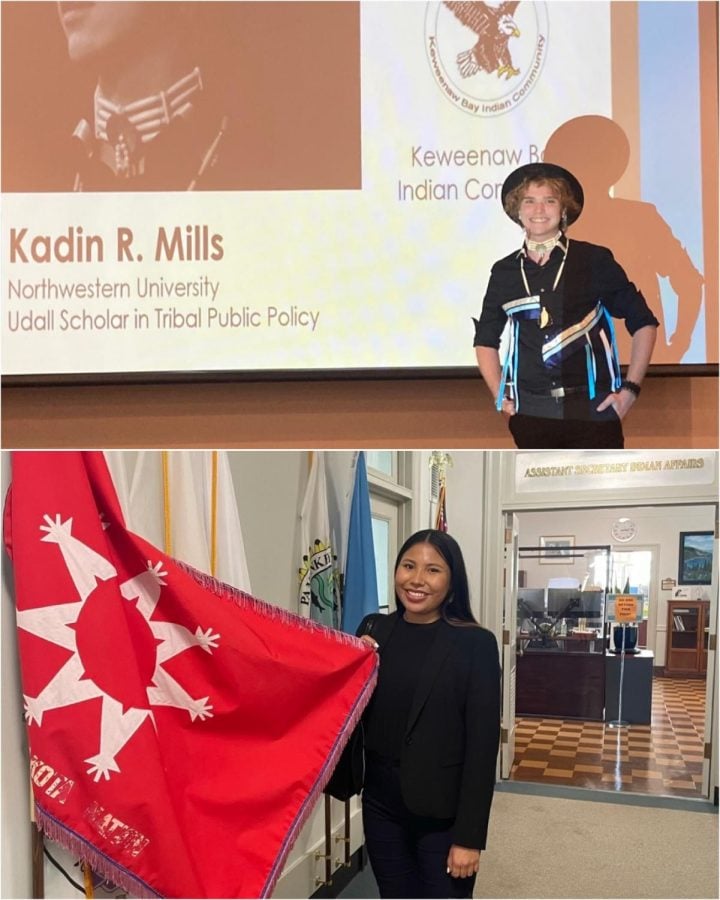Northwestern federal award recipients reflect on their experiences, future endeavors
Photos courtesy of Kadin Mills, Isabella Twocrow
Udall Foundation alums Isabella Twocrow and Kadin Mills on their educational leadership experiences with the organization.
August 17, 2022
After winning competitive awards through the Udall Foundation — which focuses on supporting policies for Indigeneous people and environmental activism — SESP junior Isabella Twocrow and Medill sophomore Kadin Mills said they have been empowered by the networks and knowledge they acquired.
Jason Curley, education program manager at Udall, said the foundation has three core values: civility, integrity and consensus, but those who apply for awards don’t necessarily have to restrict their activism to these tenets.
“We don’t want that to be a constricting framing in which a student should (solely) present themselves,” Curley said. “(Instead we say,) ‘What can we do from what we provide through these programs that can support your goal and your career path?’”
Mills, who is Keweenaw Bay Indian and the head of communications for the Native American and Indigenous Student Alliance, is Northwestern’s first Native recipient of the $7,000 Udall Undergraduate Scholarship.
Mills, a former op-ed contributor, said when he went to his first powwow — a Native American and Indigenous celebration involving food and dances — the summer after seventh grade, he was exuberant. It was his first real exposure to his cultural heritage, because his mother, an enrolled tribal member, hadn’t been a stable part of his life earlier in his childhood. From that moment on, he embraced a part of his identity he said he didn’t fully understand for much of his life.
In the seven main essays of the application, Mills wrote primarily about tribal environmental activism and policy. In an optional eighth essay, he said he opened up about his familial situation, writing about his mother’s experience with homelessness after being illegally evicted early last year from their home of nine years, and now living paycheck to paycheck in a motel. He said throughout middle and high school his mother encouraged and ensured Mills would attend college, and his reporting is meant to honor her.
“She was the one who pushed me to go to college,” Mills said. “I was determined to make sure that I can pursue the work that I want to do and make sure my mom isn’t just another statistic … another single, recovering alcoholic Native American person.”
Mills said he loves journalistic storytelling and the Udall scholarship will allow him to share the stories of Native people who are going through similar situations.
H spent three weeks at the end of summer working with Medill Prof. Patty Loew as a research assistant at the Bad River Ojibwe Reservation (Mashkiiziibii) running Tribal Youth Media workshop. The project mentors native youth and teaches them documentary film making skills, seeking to create future land stewards, environmental and tribal activists and storytellers — helping break cycles of generational trauma, Mills said.
The scholarship allowed him to feel less defined by his challenges as a first generation, low-income college student from a familial history of generational trauma, he said.
“I am in a position where I can just completely cut the head off of that vicious snake of a cycle,” Mills said.
NAISA co-chair Twocrow, who is Oglala Lakota and member of the Ho-Chunk Nation, is the first NU student to earn the Udall Native American Congressional Internship, where American Indian and Alaska Native students gain hands-on experience with the federal policy-making process to understand the relationship between the government and Tribes.
This summer, she interned in Washington D.C., working on projects with the assistant secretary of the office of Indian Affairs within the U.S. Department of the Interior, which administers laws, strengthens government-tribe relations and manages land.
“I wanted to take this internship to learn if I wanted to go to law school, what I wanted to do when I graduated, if this is something I’d be interested in,” Twocrow said. “The answer is yes to all of that.”
Twocrow said she went to a predominantly white high school in New Mexico where, despite the high Native population, there weren’t enough resources for Native students. When applying for college, a process she said was very self-guided and strenuous, she wanted a school with Native faculty where she could be closer to her tribe and family.
She said the experience, and her identity as one of the few in her family to go to college, inspired her to work in education policy.
“My motivation for wanting to reform education is so no matter where the Native student is … that they have community and people there to support them to get into higher education,” she said.
Mills said he plans to utilize his new position as a Udall alumni to continue advocating for environmental justice and justice for Native people. Twocrow said she will also take what she learned to support Native people legislatively.
Curley said despite competitive applicant pools, Native students should not feel intimidated to apply to Udall opportunities or others.
“It can be very intimidating because you fall into that realm of ‘Oh, I’m not good enough,” Curley said. “Native students should very much approach any of these awards with the confidence that (these awards exist) to support your community, your tribe, and your desire to give back to your tribal community.”
Clarification: This story has been updated to more accurately reflect Mills’ personal life and the Udall Foundation’s values.
Email: [email protected]
Twitter: @Astry_tpwk
Related Stories:
— Native American and Indigenous Student Alliance organizes Northwestern’s first student-run Pow Wow
— Not invisible: Students create solidarity and community in NAISA
— Mitchell Museum welcomes three new Native American board members


